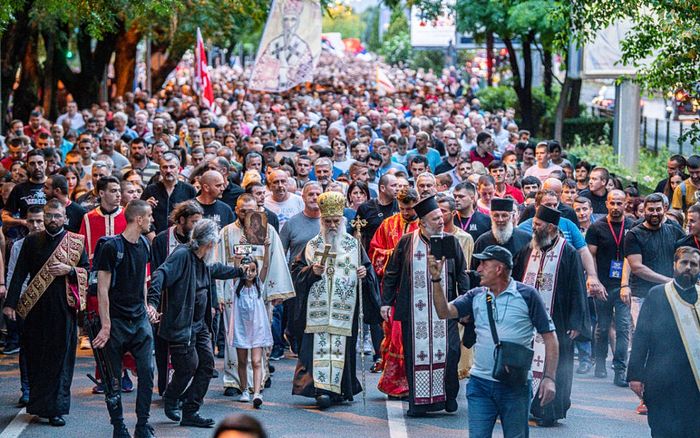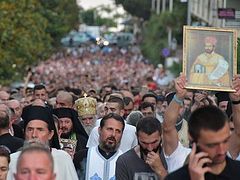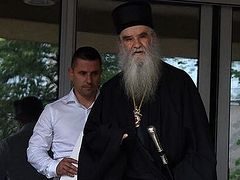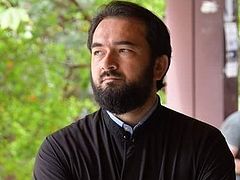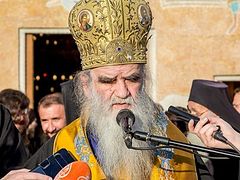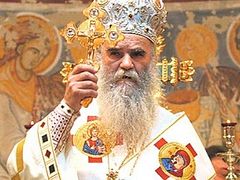Montenegro, June 29, 2020
More than 400 medical workers from throughout the tiny Balkans country of Montenegro have come out in defense of the Serbian Orthodox Church against the provocations and persecution from the state.
After a group of medical workers from the city of Nikšić was assaulted for participating in a cross procession in defense of the Church and its holy sites, they wrote a statement in defense of the Church, which was later signed by hundreds more doctors across the country, reports the Metropolis of Montenegro of the Serbian Church.
The doctors categorically rejected the accusations that they had been manipulated by the clergy, saying, “It was our decision, stemming from a desire to be with our Church and with our people.” Both as doctors and simply as people, the signatories are completely against any form of discrimination, regardless of national or religious affiliation, their statement reads.
The number of signatories continues to grow, the Metropolis reports.
A campaign under the slogan, “Students Won’t Give Up Their Holy Sites” has also gathered 150 signatures from students in Nikšić and the capital city of Podgorica.
Furthermore, on Saturday, June 27, more than 100 media representatives appealed to the country’s authorities to respect the basic human right to freedom of religion.
“If we are silent, then injustice will speak… If we close our eyes, we will live in darkness… We fight with great zeal for freedom of speech, we fight against corruption and organized crime. But we are also fighting for respect for all human rights guaranteed by the constitution of Montenegro. That is why we will fight for religious freedom with the same zeal,” the journalists stated, calling on the authorities to make concrete changes to the scandalous “Law on Religious Freedom” and to stop persecuting the priests and believers of the Serbian Orthodox Church.
They also appealed to the international community to take a more active role in protecting the rights of the Montenegrin faithful.
On June 25, Newsweek published an article by Rev. Johnnie Moore and Nury Turkel, commissioners of the United States Commission for International Religious Freedom, entitled, “Jews, Muslims and Christians Are All Persecuted in Europe. It Must Stop Now.,” in which they detail and condemn the persecution against the Serbian Orthodox faithful in Montenegro.
“The Serbian Orthodox Church justifiably fears that the law is a pretext for seizing its property,” the commissioners write.
The same day, the People’s Assembly of Republika Srpska (Bosnia and Herzegovina) adopted a Declaration on the Protection of the Rights of the Serbian Orthodox Church to Freedom of Religion and Its Property in Montenegro.
In the declaration, the Parliament calls on the Montenegrin authorities to stop trying to forcibly seize churches, monasteries, and other property from the Serbian Church, to stop deporting priests and monastics, and to seek a solution to the problem on the basis of the constitution and laws of the nation through a dialogue with the Serbian Church in Montenegro.
The Assembly also expressed concern about the arrests, harassment, and even beatings of bishops and priests of the Serbian Church in Montenegro, and strongly condemned the arrest, imprisonment, and trial of His Grace Bishop Joanikije of Budimlja and Nikšić.
However, despite the domestic and international outcries, the Montenegrin authorities are not prepared to listen. Already the next day, June 26, the Montenegrin Foreign Ministry called the declaration from Republika Srpska a gross interference in the internal affairs of another country, claiming that the document contains baseless and inaccurate statements and hurts neighborly relations between the countries.
The Holy Synod of the Serbian Orthodox Church has also condemned the persecution of the Church in Montenegro several times, mostly recently at its session on June 25. In particular, the Synod noted its concern over the fact that His Eminence Metropolitan Amfilohije of Montenegro was recently held and interrogated for 6 hours in Podgorica following a cross procession.
The Synod again called upon Montenegrin authorities to cease persecuting the Church and to act according to civilized norms.
“We pray to God,” the Synod’s message reads, “that peace and brotherly love will prevail in Montenegro among all citizens, regardless of their faith, nationality, or political affiliation, and we call upon the faithful to be responsible and worthy in protecting the holy places and their inalienable right to freely profess their faith.”

